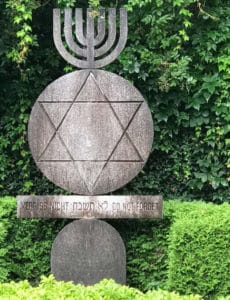Never Forget: SMC student makes summer research trip to Holocaust Sites
by Lisa Mincey Ware

While in Auschwitz, Richardson photographed this display of prisoner uniforms and photos.
“I went into the trip intending to use my history major for politics; I came out of it wanting to teach…”

This article appeared originally in the Fall/Winter issue of Frontiers Magazine.
For freshman students, the first year of college is spent getting acclimated to a new campus and new expectations. Most students don’t pursue original research in their chosen majors until their junior or senior year.
Shelbie Richardson isn’t most students.
Last spring, while still a freshman, the Gaffney native worked with history professors Drs. Cole Cheek and Kirk Hansen to craft an application for research funds from the South Carolina Independent Colleges and Universities, Inc. (SCICU). Richardson, who has been interested in World War II since high school, hoped to use the funds to travel to Germany and Poland for research into how the identity and culture of the Jewish people has changed since the Holocaust.
In May, Richardson learned she’d received $3,100 to fund her trip – the highest amount ever awarded by SCICU to an SMC student.
Two months later, after a whirlwind of preparations, Richardson flew to Munich, Germany, on her first trip outside of the United States. Her goal: to tour Dachau, the first Nazi concentration camp built in Germany. “Most of the camp was destroyed, and the purpose of the memorial site is to educate visitors about what happened there so that it won’t be forgotten,” Richardson says. “What I noticed most was the absolute quiet and feeling of sorrow. I don’t think there’s a word that can really describe the sadness lingering there.”
While in Munich, Richardson also went to the Jewish Museum and visited the Ohel Jakob Synagogue to interview two of its rabbis. “The rabbis told me that many survivors of the Holocaust became Orthodox Jews. Instead of weakening their faith or the faith of their families and children, their experiences in the camps actually strengthened it,” she says.
After three days in Germany, Richardson flew to Krakow, Poland, to see Auschwitz. “I didn’t realize that many of the German Jewish prisoners were actually transported to Auschwitz rather than to Dachau, which was only a few minutes from Munich,” she says. “Most of Auschwitz has been perfectly preserved. It was a very different experience from Dachau. Instead of sadness, I felt a strong sense of anger there.”
Although her trip was less than a week, Richardson said the experience changed her forever. “When you see the artifacts – the records, the photographs, the belongings and the graves – I don’t understand how anyone can deny the Holocaust happened,” she says. “We learn about it in this country, but it doesn’t seem very real. It’s real to me now.”
Back at SMC for her sophomore year, Richardson will spend this fall writing the research paper she’ll present at a SCICU conference in February 2018. She says her future plans are another thing that changed as a result of her research. “I went into the trip intending to use my history major for politics; I came out of it wanting to teach, knowing that if I teach college students about those who died and the horrific acts that happened, the legacies of those who have passed will live on. And hopefully, the world will never have to see a genocide like that ever again.”
